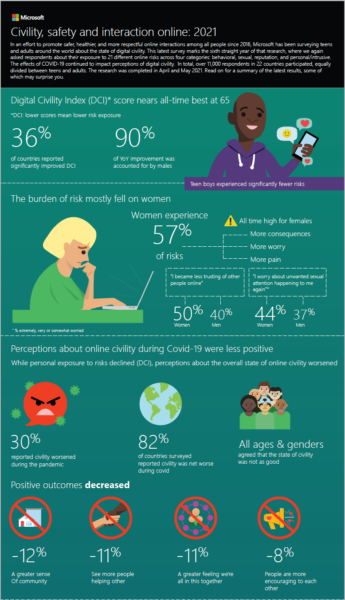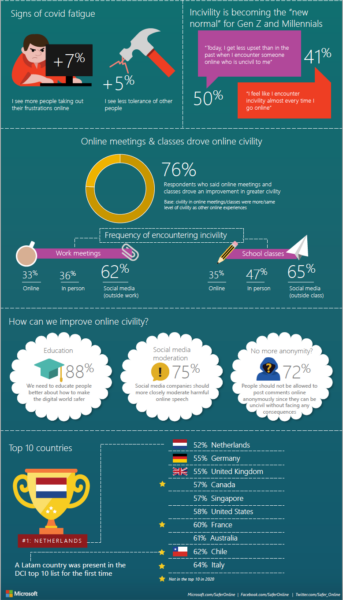Microsoft DCI Survey Reveals Teen Girls & Women Report Being More Exposed Online

The latest Digital Civility Index (DCI) has revealed that teen girls and women reported being both more exposed to online risks and feeling more severe consequences as a result.
Microsoft South Africa shared the findings of the organisation’s DCI at its Women@Microsoft Digital Safety and Tech Savvy Parenting event on Tuesday,
The global survey, in its sixth year, asked teens aged 13-17 and adults aged 18-74 about their exposure to 21 different online risks across four categories including behavioural, sexual, reputation, and personal/intrusive and their experiences of life online.
This year’s global DCI score stands at 65 percent, which is the best it has been since the survey began in 2016, an improvement of two percent since 2020.
The DCI revealed that the overall gains were driven primarily by males: 90 percent of the year-on-year improvement seen was accounted for by men, with teenage boys experiencing significantly fewer risks.
Females experienced almost 60 percent (57 percent) of all risks reported in 2021, an all-time high, and were also more likely to have experienced consequences, worry or pain due to being treated uncivilly.
Andréa Campbell, Commercial Attorney at Microsoft South Africa said insights from the research indicate that more frequent use of social media and messaging apps could be driving the higher share of risk and making women more vulnerable online.
“Nearly 70 percent of women (69 percent), for instance, use social media several times a day, compared to 59 percent of men. This figure is even higher for teens: 72 percent of teenage girls use social media several times a day, compared to 62 percent of boys.”
Rianette Leibowitz, Cyber Wellness, Online Safety and Digital Parenting Expert, and Founder of SaveTNet Cyber Safety said half of all women admitted to becoming less trusting of other people online – opposed to 40 percent of men.
“While the study indicates a gap between how males and females experience and view online civility, it is important to educate and remind digital citizens that everyone is at risk and that each one of us creates a ripple effect with every click we make online – be it positive or negative.”
The survey also checked in on people’s perceptions of what’s needed to help create a safer online environment for everyone – and nearly 9 out of 10 respondents, across all genders and age groups, stated that there’s a need to better educate people on how to make the digital world safer.
Three-quarters also said that social media companies should moderate harmful online speech more closely.
Leibowitz said the results show that it is critical for multiple stakeholders to collaborate to build a safer internet together.
Another part of this approach to promote digital civility is encouraging people to take the Digital Civility Challenge, which is made up of four ideals:
- Live the Golden Rule by acting with empathy, compassion and kindness in every interaction, and treating everyone you connect with online with dignity and respect
- Respect differences, honour diverse perspectives and, when disagreements surface, engage thoughtfully, avoiding name-calling and personal attacks
- Pause before replying to things you disagree with, and don’t post or send anything that could hurt someone else, damage a reputation or threaten someone’s safety
- Stand up for yourself and others by supporting those who are targets of online abuse or cruelty, reporting threatening activity and preserving evidence of inappropriate or unsafe behaviour








